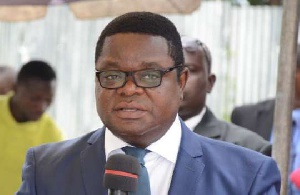 Prof Peter Quartey, Director of the Institute of Statistical, Social and Economic Research (ISSER)
Prof Peter Quartey, Director of the Institute of Statistical, Social and Economic Research (ISSER)
The Director of the Institute of Statistical, Social and Economic Research (ISSER), Professor Peter Quartey, wants clarity as to whom will be benefit from the expected GHS1 billion stimulus package announced by President Nana Addo Dankwa Akufo-Addo for businesses and households and how the money would be distributed.
Finance Minister Ken Ofori-Atta, to this end, is billed to table before Parliament today, Monday, a stimulus package proposal.
“GHS1 billion for SMEs is a good gesture but my question is: How? I don’t think I got ‘the how’ GHS1 billion for whom; how does one qualify? I believe by now we should have known the how. Otherwise, people will think it is just one of the political statements [and that] it won’t happen.”
“I expect to see, in the next coming days if not quicker, ‘the how’ is made available; so that business know that yes, I qualify because I pay taxes I qualify; if I do not pay taxes, I do not qualify. Then we also look at the informal system, you said SMEs, does it include the informal system, how are you able to know which companies within the informal system are covered?
“I took a glance at the Ghana Living Standards Survey, the informal sector accounts for about 71% plus of total employment and then the formal sector accounts for 28% of employment. So, you can see that the informal sector is quite big in our economy. How are you going to support them so that people do not lose their jobs and livelihoods? Then, also, you find that the public sector employs only 6.8% of the total labour force, whereas the private sector employs 92.5 per cent. Public sector workers are guaranteed their salaries, what about private sector workers?”
Many employees, particularly those in the non-essential services, have been asked to proceed on leave because of the earlier directive by the President. They include teachers.
The ISSER director told Accra-based Joy FM that: “Schools have been closed down, what happens to teachers if this extends beyond May or June? In the UK, private sector employees have been guaranteed up to 50 per cent of their wages for up to three months. I have not heard anything from the government whether this GHS1 billion will cover wages or just to help you pay your bills. I think we need more about how this is going to turn out.”
Professor Quartey also called for transparency and accountability in the disbursement of the funds.
“In the past, we have seen government support going to party faithful, employees or businesses that one way or the other are linked to somebody. I think we should move away from that.
“Whether you are NPP, NDC, PPP or whatever, so long as you have a business and you are registered and you pay taxes, this should be very transparently specified, ascertained and implemented in a very transparent fashion.
“If we do this, I believe no matter how small the amount is, it will go a long way to alleviate some of the sufferings.”
Ghanaians, particularly the vulnerable, are now waiting to hear whether or not the government will provide a stimulus package that will cover individuals and families.
Already, the Bank of Ghana has slashed down its policy interest rate by 200 basis points to provide some relief for consumers.
The central bank also announced some measures to aid the monetary economy, which included a reduction in the primary reserves requirement from 10% to 8%.